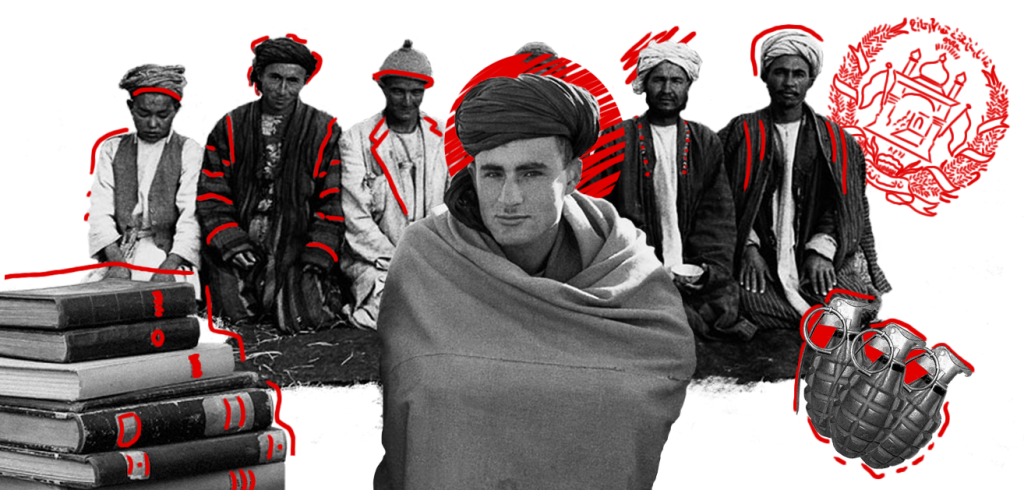What remains of Afghanistan
Interview with the writer Farhad Bitani
On August 16, 2021, the Taliban conquered Kabul, putting an end to the war that had been fought in the country for twenty years. The American intervention began on 7 October 2001 with the launch of Operation Enduring Freedom as a reaction to the 9/11 attacks of the same year. The mission’s objective was, at least initially, to strike at the Taliban regime which ruled the country and which provided hospitality to the minds of the attacks. Since that time, the United States and its allies have maintained a permanent military presence with the declared purpose of defending the new Afghan Republic from the return of the Taliban. This was until August 30, 2021 when Western troops, following an agreement, withdrew from Afghanistan, leaving it under the control of the Taliban.
The dramatic scenes seen at the Kabul airport and the news that arrived from Afghanistan prompted us to start a work together to come to form our own judgment on the Afghan situation and to understand something more of the reality that surrounds us. To do this, we decided to interview someone who has seen firsthand what has happened in recent years in Afghanistan. So we turned to Farhad Bitani, writer and former officer of the Afghan army, author of the book “The last white sheet”.
What did living in Afghanistan mean for you and what did you see change?
Living in Afghanistan for me meant living surrounded by violence without the possibility of going to school and without being able to leave the basement of the houses for fear of war. When the Americans arrived in 2001 we were happy because we thought that finally someone was worried about Afghanistan, but the recent return to power of the Taliban has shown that in recent years we have not done anything concrete to improve the situation. Instead of solving the problem of violence we have aggravated it, we have not worked on culture and education by spending 95% of the resources on weapons.
How do you judge the intervention of the Americans?
We were very happy for the arrival of the Americans because we thought they would finally bring freedom to our country, however we soon realized that they were there for their interests attracted by its strategic position near Iran and to prevent China from putting hands on the mineral wealth of Afghanistan. They used the name of democracy to serve their interests by allying themselves with criminals to fight the Taliban. They installed a corrupt government and if the Taliban managed to regain power in such a short time it is because they were supported by the people who preferred them to the Americans.
What happened when you came to Italy?
What I saw and that made me change is what I call the “beauty of the different”: the encounter with the different through small human gestures. As soon as I arrived in Italy I hated what was different because I had grown up under the Taliban regime who taught not to make friends with Christians and that by killing an infidel I would go to heaven. Over time, I began to wonder why the Italians didn’t hate me. I remember, for example, when I went for Easter to the home of a friend of mine at the military academy, I remember that his mother treated me as if I were her son taking care of me when in those days I was very ill, this and other gestures began to make me think, so I began to deepen my identity as an Afghan and discover my religion more, this is how the encounter with the different made me become the person I am today. Diversity may seem difficult to accept but it is precisely by experiencing diversity that a person can enrich his identity.
What hope is there for the Afghan people?
The situation in Afghanistan is dire. The majority of families do not have anything to eat and if action is not taken immediately it will be a humanitarian catastrophe, many people sell their organs to find financial support for their families. If we want a change we must involve Pakistan which is a fundamental country for the Taliban, the Taliban are in the hands of the Pakistani secret services who could force them to make a government that involves all Afghans. Unfortunately this is not on the agenda of the major G20 governments. It is also important not to make the mistake of supporting new armed groups, otherwise there will be a new civil war.
What can we do for Afghanistan?
It will be essential to help the Afghans who have fled to Italy. Each of us will be lucky enough to meet them on their life path. Afghan women must also be taught that they are as free as men, because they do not know what it means to be a woman in a society like the Italian one and have never known freedom within Afghan society.
The meeting with Farhad Bitani convinced us of one thing: a man is what he meets. The discovery of our own identity and our becoming what we are necessarily involves meeting someone other than us.

